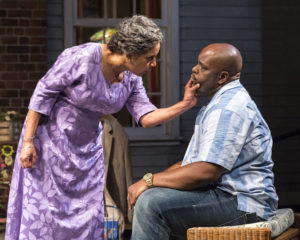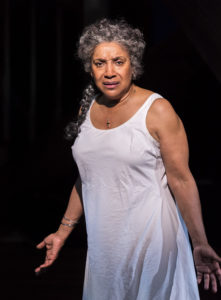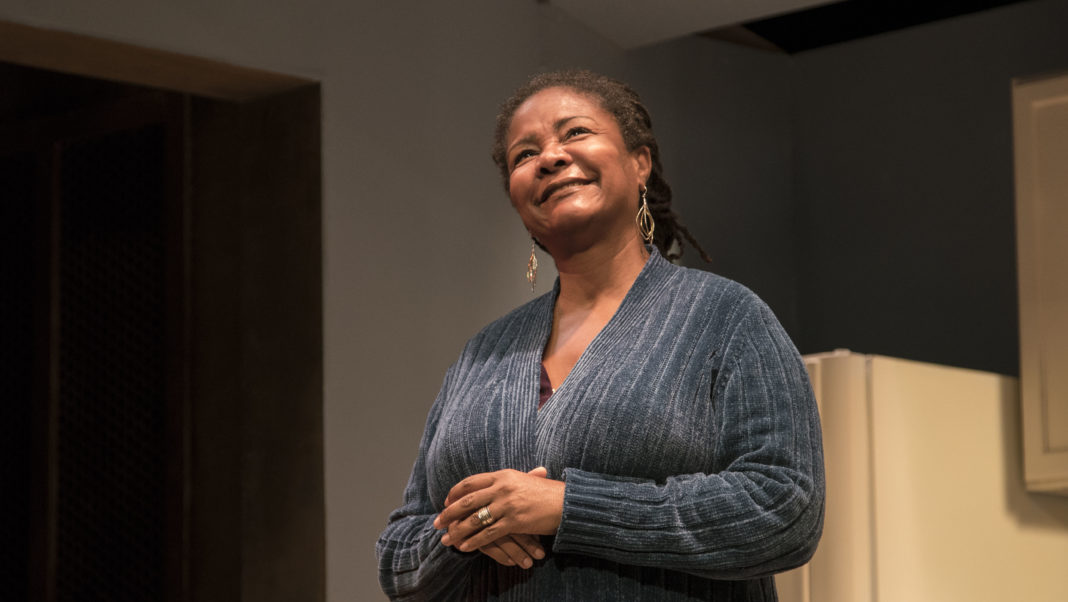It is often said that when an actor tackles a large, heavy role, it is considered that person’s Lear. This is used over and over again, but almost exclusively for men. There are two performances currently going on in Los Angeles that easily qualify as an actor’s Lear, but they are both staggering performances by women.
In Alessandro Camon’s Time Alone, currently in performance at the Los Angeles Theatre Center, Tony Award winner Tonya Pinkins gives a towering performance as a woman trying to come to terms with the anger and grief that has resulted from the murder of her police officer son.

Time Alone is structured as a pair of intertwined monologues. In addition to the grieving mother, the other series of monologues belongs to Alex Hernandez as a young man who killed a gang rival. He is quite good. But the show belongs to Pinkins.
During this 90 minute play, she covers the full range of emotions. She will make you laugh, she will make you think and she most certainly will make you cry. When I spoke to her about the role, she mentioned that is was so taxing she was likely to “hide after every show. I have to live in that tragedy every single day and it’s taking its toll on me.”
This woman’s grief is so profound it will resonate with anyone who has felt intense grief for any reason. That is a testament to the outstanding performance Tonya Pinkins gives every night.

A little further northwest at the Mark Taper Forum, Phylicia Rashad, also a Tony winner, is the foundation, the rock of Gibraltar, of Tarell Alvin McCraney’s powerful play Head of Passes.
As Shelah, the matriarch of a family facing a powerful storm that threatens them all, Rashad gives a career-defining performance. No matter how good she’s been in other plays, this is absolutely a woman’s equivalent to Shakespeare’s King Lear.
Inspired by the Book of Job, Shelah faces not just intense tragedy, but a crisis of faith that puts her squarely in a battle with God. Most of the second act of the play is that battle with her Creator. How could these things happen to her? What does he want from her? And perhaps the question we all struggle with when something horrible happens in our lives, why?

Rashad has to dig deep to make Shelah’s battle to understand the circumstances of her life and how the god she loved so dearly could put her through this. These are questions we’ve all asked, but no one has asked them as ferociously as Rashad does in this play.
What’s amazing about these two performances is that they are both written for women who aren’t in their 20s or 30s and they are both performed by women of color. Interestingly, Time Alone was not written as an African-American woman. Pinkins gives full credit to playwright Camon for being open to her being cast as the mother. McCraney’s play was specifically written about an African-American family.
In the end, it doesn’t matter. So beautifully written are these plays and they are so powerfully performed by these two women, that the questions asked and the emotions stirred transcend immediately regardless of age, gender or race.
These are two performances that must be seen. Head of Passes concludes its run this Sunday, October 22nd. Time Alone continues through October 29th.
Photo Credits: “Time Alone” – David Morrison; “Head of Passes” – Craig Schwartz












